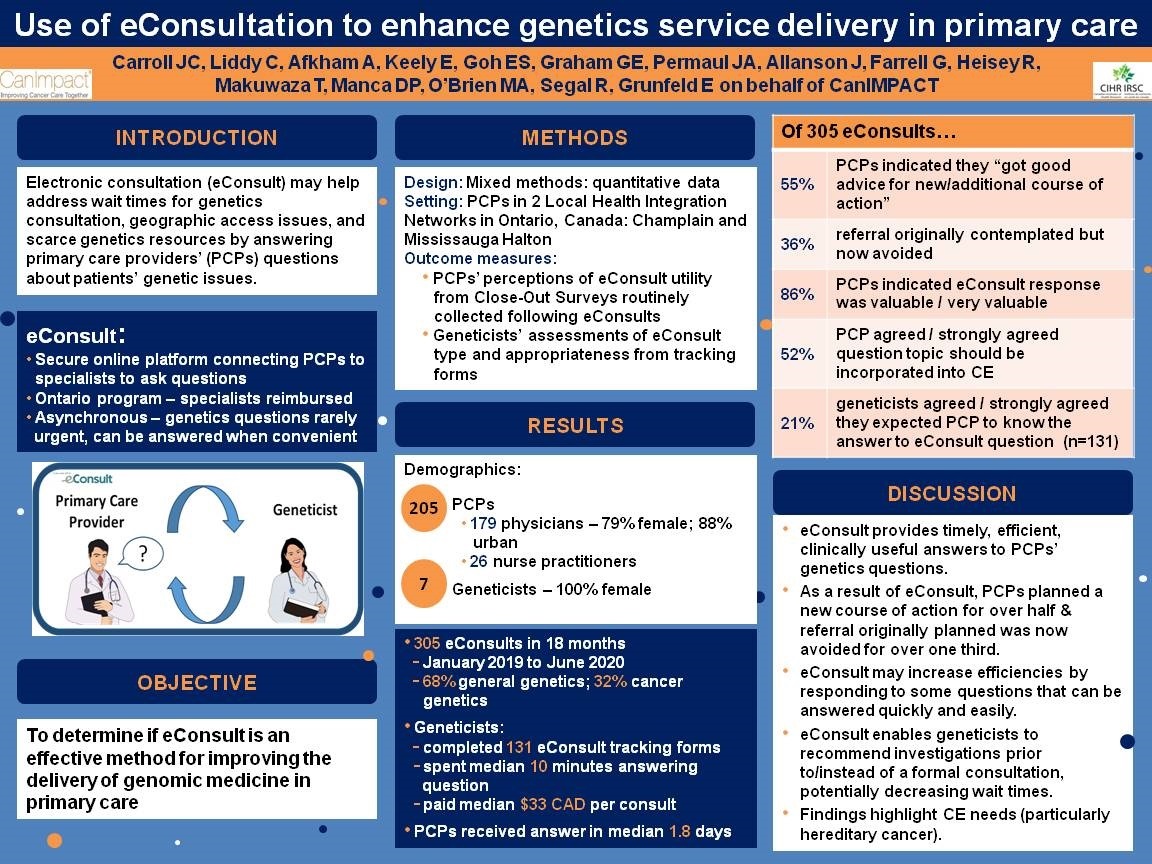PCR077: Use of eConsultation to enhance genetics service delivery in primary care
June Carroll, MD; Clare Liddy, MD, MSc, CCFP; Amir Afkham, BEng Hnrs; Erin Keely, MD; Elaine Goh, MD, FRCPC, FCCMG; Gail Graham, MD, FRCPC, MSc, FCCMG; Joanne Permaul, BSc, MA, CCRP; Judith Allanson, MD, FRCPC, FRCP FCCMG DABMG; Ruth Heisey; Tutsirai Makuwaza, BSc, MA; Donna Manca, MD, MCLSC; Mary Ann O'Brien, PhD; Eva Grunfeld
Context: Electronic consultation (eConsult) is a secure online platform connecting primary care providers (PCPs) to specialists that may improve genetic consultation wait times by answering PCPs’ questions about patients’ genetic concerns. Objective: To determine if eConsult is effective in improving delivery of genetics services in primary care. Design: Questionnaire design with data collected from surveys completed by PCPs at termination of genetics eConsults and geneticist-completed eConsult tracking forms. Setting/Participants: PCPs and 7 geneticists in 2 Ontario, Canada regions. Intervention: Evaluation of existing eConsult system. PCPs initiate genetics eConsult questions to participating geneticists who complete the eConsult and send PCPs a response electronically. Outcome measures: PCP perception of the eConsult utility and value, geneticist assessment of type and appropriateness of eConsults. Findings: From January 1 2019 to June 30 2020, there were 305 genetics eConsults, 272 (89%) by MDs and 33 (11%) by NPs, 207 (68%) general genetics, 98 (32%) cancer genetics. Median time spent by geneticist to answer was 10 min (SD 7.3) and median time to answer was 1.8 days (SD 3.5). Genetics eConsult outcomes: For 169 (55%) genetics eConsults, PCPs indicated they got good advice for a new course of action that they will implement, for 106 (35%) they were able to confirm their course of action. For 110 (36%), PCPs indicated referral was originally contemplated but now avoided, for 89 (29%) referral was originally contemplated and still needed. For 261 (86%) PCPs said the eConsult was valuable/very valuable in evaluating or managing the patient, and for 160 (52%) they agreed/strongly agreed that the genetics problem addressed should be incorporated into CME. Geneticists completed 131 genetics eConsult tracking forms (43% of total: 111 adult, 20 pediatric). eConsults regarding cancer were most common (68, 52%), with genetic syndrome (11, 8%) and ethnicity (7, 5%) related questions next most common. For 63 (48%) eConsults, geneticists disagreed/strongly disagreed that they expected PCPs to know the answer to the eConsult question. Conclusion: eConsult offers a potential virtual solution to receiving timely advice given the increasing demand for genetic consultation and testing, as well as avoiding unnecessary patient referrals. For greater impact on access and wait times, it may need more systematic integration into referral workflow of PCPs and geneticists.

Jack Westfall
jwestfall@aafp.org 11/20/2021This is a great topic and research study. Nice work. Thanks